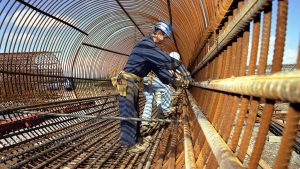A labour force expert sees shifting levels of construction activity across provinces, along with fluctuating immigration numbers and impending retirements as significant factors affecting construction going forward.
executive director Bill Ferreira spoke at a session titled, The State of the Construction Workforce – Trends, Challenges, and Opportunities at the 2024 Construction Innovation Summit in Vancouver.
Ferreira said British Columbia is going through a pause as a number of significant projects have been completed or are in the process of winding down, but added institutional construction and transit projects will drive investment levels higher.
“There’s a tremendous amount of projects we’re following that while we haven’t included in our forecast are out there, many of which are well over $50 billion in potential investment. Once they’ve received a positive final investment decision these will have a significant impact in the next five or six years on construction activity in the province,” Ferreira said.
He expressed optimism for potential construction activity but warned a restricted labour supply could dampen expectations.
“It’s a really good time to be in construction in that there’s a lot of activity and that excludes the demands we’re seeing on the housing side,” he said. “Once we factor those in, we’re really going to find it difficult with the existing workforce we have to actually meet all those demands, certainly in a timely manner.”
Alberta is still seeing both a significant rise in population and of economic activity in the foreseeable future, Ferreira said.
“Since 2000 the population of Alberta has grown by 56 per cent,” he said. “We’re also seeing workers from other provinces such as those who came to B.C. to help out with Kitimat and Site C return to Alberta where there’s a lot of activity going on.”
While immigration has recently become a contentious issue, Ferreira said Canada is capable of taking in new and needed workers to the labour force but in a measured fashion.
“It isn’t that we can’t accommodate heightened immigration, we just need a bit of a pause. I’m not suggesting we shouldn’t continue to bring in immigrants because obviously the country needs them, but we can’t at the levels we saw in 2023,” he said. “It did really swell the overall numbers.
“We’re now getting back to the government’s projections which are roughly 450,000 individuals over the next three years. That is certainly sustainable,” he said.
Another big challenge for the industry is incentivizing smaller employers to help with apprenticeship development, Ferriera said, as “many small employers simply don’t have the resources.”
There are also stumbling blocks from the employee perspective, he added.
“The big challenge we face for a lot of young people that want to pursue a career as an apprentice and eventually journeyperson is the starts and stops natural to construction because this is a project-based industry,” he said. “You can’t guarantee full-time employment throughout the year and those starts and stops become demoralizing for those who want to complete their apprenticeship in a relatively short period of time.”
Employers must “get creative” and use these individuals on as many projects as possible, he added, because “young people have a lot of opportunities before them and if we want to continue to attract our share of the best and brightest out there we need to make sure we aren’t creating barriers that actually discourage them.
“The reality is we have a significant number of individuals moving towards retirement and although we’ve seen heightened levels of entrants into the industry, we need to sustain that or we’ll become very dependent on immigration as the only source of recruitment for construction moving forward,” Ferreira said.











Recent Comments
comments for this post are closed